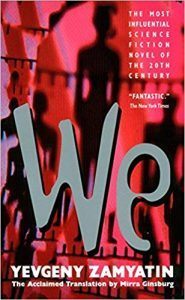by Niall Chithelen
 A number of scenes in Eugene Zamyatin’s dystopian novel We (1921) echo moments from Alexander Bogdanov’s utopian Red Star (1908). Bogdanov was a Bolshevik when he wrote Red Star (he was expelled from the party some years before the Russian Revolution), and his “red star” was a socialist, wonderfully technocratic Mars whose residents are preparing to export revolution back to Earth. Zamyatin, also once an Old Bolshevik, wrote in the disturbing aftermath of the Russian Revolution, and his We takes place on a future Earth, ruled over by the United State. It is possible to read We as a response to Red Star and its intellectual moment, with Zamyatin flipping Bogdanov’s Bolshevik idealism to reflect the fright of Bolshevik reality. Bogdanov sought a sort of Communist technocracy, and Zamyatin sensed its enormity, feared it. But, while the two books do offer different political conclusions, the authors seem to share an important belief in humanity and its imperfections, as they provide rather similar answers to a fundamental question of their genre: what kind of freedom do we really need?
A number of scenes in Eugene Zamyatin’s dystopian novel We (1921) echo moments from Alexander Bogdanov’s utopian Red Star (1908). Bogdanov was a Bolshevik when he wrote Red Star (he was expelled from the party some years before the Russian Revolution), and his “red star” was a socialist, wonderfully technocratic Mars whose residents are preparing to export revolution back to Earth. Zamyatin, also once an Old Bolshevik, wrote in the disturbing aftermath of the Russian Revolution, and his We takes place on a future Earth, ruled over by the United State. It is possible to read We as a response to Red Star and its intellectual moment, with Zamyatin flipping Bogdanov’s Bolshevik idealism to reflect the fright of Bolshevik reality. Bogdanov sought a sort of Communist technocracy, and Zamyatin sensed its enormity, feared it. But, while the two books do offer different political conclusions, the authors seem to share an important belief in humanity and its imperfections, as they provide rather similar answers to a fundamental question of their genre: what kind of freedom do we really need?
*
In We (1924, set in the 30th century), the United State’s members understand that freedom is a “primitive state,”and that their unchanging happiness comes from their lack of freedom. All people operate on the same routine. Everyone lives according to the “Tables of Hours,” which delineate the exact time that they wake up, eat, drink, and perform other daily activities. Buildings are made of glass so that all members of society can see that everyone else is doing the same thing at the same time. D-503 revels in this routine, standing in awe of the great collective, the “single body with a million hands.” What changes, however, is that he sees I-330, a woman, who, despite not being D-503’s assigned lover, inspires in him a messy, decidedly non-routine yearning.
D-503 knows of some old ways of thinking from days when people did value freedom, but the United State has given him the logic to reject such thought. It is fitting, then, that he begins to deviate from the State for illogical reasons, pursuing I-330 to the detriment of his lifestyle, to the detriment, we learn, even of the United State itself, for I-330 is a member of a rebel group. When they start their revolution, the crackdown from the State is brutal, and D-503 is captured and brought before the leader, the great Well-Doer.
The State has developed an operation that removes a person’s ability to think independently. The Well-Doer holds forth to D-503 on this operation and the Christian God, recalling the story of Eden. “Remember,” he tells D-503, the tempted, “there in paradise they knew no desires any more, no pity, no love; there they are all—blessed.” So too, he says, the recipients of the operation be “blessed.” D-503 finds the Well-Doer’s system-logic compelling. But he is human, like Adam; eating the forbidden fruit might have been a mistake, but Adam still did it. To make that mistake is human. The Well-Doer is proposing to change humanity at nearly its most basic level. Before he was even captured, I-330 had presented D-503 with the choice between her and the operation. Even though his relationship with I-330 brought him anguish, insecurity, dread, and existential confusion, and choosing the Operation would have meant paradise and “one-hundred-per-cent happiness,” D-503’s revolt was in the name of unhappiness, and he was sure of this much: “I do not want salvation…”
*
 Much like the United State, Martian society in Red Star emphasizes uniformity, collectivism, and order. Most people on Mars dress the same way, the men and women are almost indistinguishable, and everyone speaks the same language. An advanced statistical system keeps track of how Martians spend their time and how much work is needed in the different sectors of the economy. The Martian dedication to the collective is so great that when something goes wrong with their spaceship, an engineer sacrifices himself quickly and willingly to save their guest from Earth. Martians memorialize important events—achievements by the collective—and relegate individuals to historical anonymity.
Much like the United State, Martian society in Red Star emphasizes uniformity, collectivism, and order. Most people on Mars dress the same way, the men and women are almost indistinguishable, and everyone speaks the same language. An advanced statistical system keeps track of how Martians spend their time and how much work is needed in the different sectors of the economy. The Martian dedication to the collective is so great that when something goes wrong with their spaceship, an engineer sacrifices himself quickly and willingly to save their guest from Earth. Martians memorialize important events—achievements by the collective—and relegate individuals to historical anonymity.
The important revolution in Red Star is the real one, in Russia, where the protagonist Leonid is from; there are no rumblings on Mars. Leonid assumes that because the society functions so well, the people must feel a “tranquil happiness.” The engineer Enno replies, however, that Martians are no happier than anyone else, because “the more perfectly ordered and harmonious life is, the more painful are its inevitable dissonances.” Herein lies the true difference between We’s United State and Red Star’s Mars: both societies are highly ordered and productive, but the goal of the United State is to eradicate non-happy feelings, while Martian society embraces them—the hospitals on Mars even have designated suicide rooms. Enno recounts a time when she felt suicidal, because to do what was best for the collective she had to leave the man she loved. In the United State, such feelings might’ve driven Enno to look outside the system, being concerningly abnormal by default for lacking happiness. But on Mars, she was allowed to feel sad, and she dutifully continued her work.
Leonid successfully integrates into Mars after the Martians bring him from Earth to Mars to learn. While trying to understand the intricacies of this deeply foreign system, however, he becomes gravely ill. Although he receives medical treatment, it is only when his Martian friend Netti reveals herself to be a woman and they declare their mutual love that his “youth and faith” return and “the old weakness” is banished. Near the end of the novel, he returns to Earth and rejoins the revolution, which is making great strides, but he gets injured. While in the hospital, he is visited by Netti, and in the epilogue, we are told that Leonid and Netti eloped together in the night, presumably headed back to Mars. The revolution apparently no longer requires these two figures. Even though they have useful information for setting up a society like Mars on Earth, they have already done their main duty; they have shown that Mars and Earth are compatible because their people can share in the experience of love, the same unpredictable, non-routine emotion that drove Enno toward suicide. Red Star is an affirmation of a certain technocratic form of Communism that We rejects, but Bogdanov affirms by the same means that Zamyatin warns—to them, it is not a superior system, a more highly functioning state, that divides utopia from dystopia, but rather the access that system affords to imperfect emotions. The most truly oppressive regime, then, is the one that denies us our unhappiness.
*
Bibliography
Lewis, Kathleen and Harry Weber. “Zamyatin’s We: the Proletarian Poets, and Bogdanov’s Red Star.” In Zamyatin’s We: A Collection of Critical Essays. Ann Arbor: Ardis, 1988.
Bogdanov, Alexander. Red Star, trans. Charles Rougle. Bloomington: Indiana University Press, 1984.
Zamyatin, Eugene. We, trans. Gregory Zilboorg. New York: E.P. Dutton & Co., 1952.
